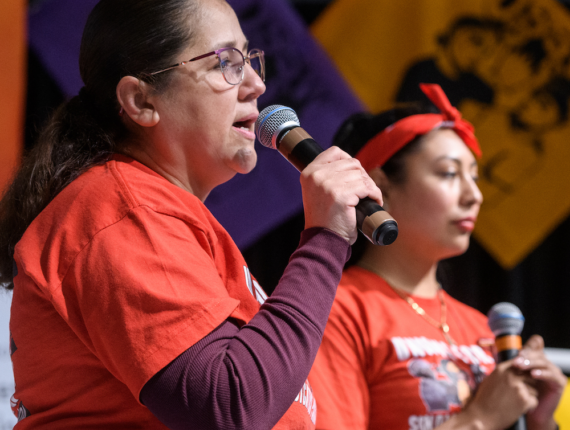How important is Social Security to protecting our country’s most vulnerable citizens? Just ask me and my younger sister Andrea.
I’ve spent nearly 20 years as the primary care provider for my sister who requires 24-hour supervision due to her developmental disability. For us, Social Security means we can pay the rent, buy food and purchase gas to take Andrea to her many appointments.

Social Security means the difference between living with dignity and living in squalor.
Other home care providers have similar stories about how Social Security protects their clients. We, however, can’t help but wonder who’ll protect us when we can no longer do this work?
The majority of home care workers are low-wage workers with no employer-sponsored retirement plan. Many are also paid current which means if their client dies today, the paychecks stop today. It’s virtually impossible to save for retirement under these circumstances. For many of us, Social Security will be our only source of retirement income.
Sadly, Social Security alone isn’t enough for a secure retirement. In 2014, the average retiree monthly benefit was less than $1,300. For millions of low-wage workers, including home care workers like me, the benefits are much lower. We can’t live on that, which leaves only two options for our golden years: retire in extreme poverty or work until we die.
It’s not fair and it’s not realistic. Our job is physically demanding; so it angers me when I think of the presidential candidates calling for raising the retirement age. That’s a reckless and irresponsible idea. Imagine lifting others at 70 years old?
Every American should be able to retire with dignity after a lifetime of hard work and playing by the rules. That’s why I’m standing with other workers across the country to call on lawmakers to address the retirement tsunami threatening our nation.
One of the fastest, most efficient and fairest ways to improve retirement security is to strengthen Social Security. Policymakers should raise benefits for everyone, with particular attention to the very low benefits received by low-wage workers. And there should be a “caregiver credit” for people who have to leave the workforce to care for family members. These modest reforms can be financed by “scrapping the cap” and making sure everyone is paying their fair share.
For home care providers, these changes to Social Security would help ease the fears many of us have for the future. Our jobs are hard enough. We shouldn’t have to wonder how—or even if—we’ll ever be able to retire.



